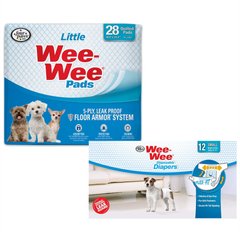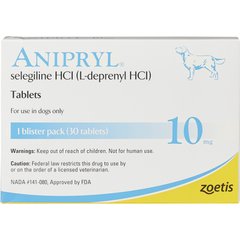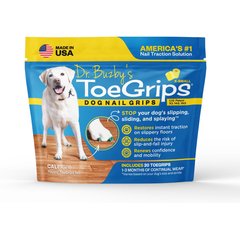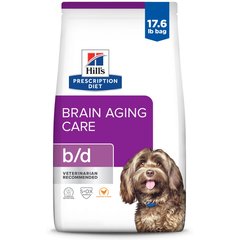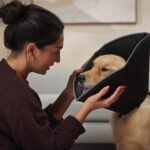What Is Dog Dementia? Causes, Symptoms, and More

Photo by ktmoffitt via iStock/Getty Images Plus
Is your senior dog suddenly having accidents in the house, getting “stuck” in corners, or failing to recognize her favorite people?
These could be signs of dog dementia, also known as cognitive dysfunction syndrome (CDS) or canine cognitive dysfunction (CCD). This condition is essentially the doggy equivalent of Alzheimer’s disease in humans.
We spoke to two veterinarians to understand the causes, symptoms, and treatment of dog dementia. Their expert advice also sheds light on how to provide the best possible support if your senior pup develops this condition.
What Is Dog Dementia?
Dog dementia is a degenerative brain condition that affects aging dogs. Much like dementia in humans, it involves a gradual decline in cognitive abilities, impacting a dog’s memory, awareness, and ability to learn new things, says Penny Coder, DVM, senior veterinarian at Small Door Veterinary in Bethesda, Maryland.
Physically, neurons (brain cells responsible for transmitting information) start to break down and die, which affects the dog’s ability to process information. Over time, the brain may shrink in size due to the loss of neurons, resulting in further cognitive decline.
Dog dementia isn’t considered a medical emergency in the traditional sense, as it progresses slowly over time. However, in advanced stages, the symptoms can worsen to the point where a dog might become severely disoriented, anxious, or even aggressive, which could escalate to an emergency situation because the dog could pose a danger to herself or others.
What Are the Symptoms of Dog Dementia?
Dog dementia is progressive, so symptoms typically get worse over time. According to Dr. Coder, common signs of dog dementia include:
- Disorientation or confusion (e.g., getting lost in familiar places)
- Changes in sleeping patterns (e.g., staying awake at night)
- Increased anxiety or restlessness for no apparent reason
- Decreased interaction with family members
- Forgetting previously learned commands or routines
- Potty accidents despite being house-trained
- Repetitive behaviors (e.g., barking, pacing in circles)
- Diminished activity level
- Getting “stuck” behind furniture or in corners
- Difficulty recognizing familiar people or pets
- Loss of appetite or interest in food
- Decreased responsiveness to cues or surroundings
What Causes Dog Dementia?
Research on dog dementia is ongoing, and while there’s still a lot to uncover, researchers have learned quite a bit about how aging affects a dog’s brain.
Here are some potential causes and risk factors:
- Aging: The most typical risk factor of dog dementia is age, with cognitive decline becoming more common as a dog gets older. Research shows that a quarter of all dogs develop CCD by 8 years old. Other research shows that the risk of CCD increases by more than half for each year of a dog’s life.
- Degeneration of brain cells: As dogs age, brain cells can start to deteriorate and die, leading to cognitive dysfunction. This primarily affects the cerebral cortex—the part of the brain responsible for learning and memory—and the cerebellum, the area responsible for coordination, Dr. Coder says.
- Oxidative stress: Accumulation of chemical reactions that can cause damage to brain cells, accelerating the aging process and cognitive decline, Dr. Coder explains.
- Plaque buildup in the brain: Like Alzheimer’s in humans, the buildup of amyloid plaques—abnormal clumps of protein—in a dog’s brain can disrupt normal brain function, Dr. Coder says.
- Genetics: “Genetics may play a role, as certain breeds [Chihuahua, Border Collies, and Australian Shepherds] are more predisposed,” Dr. Coder says. One study suggests that pups classified as toy, terrier, and non-sporting breeds may have a higher predisposition.
How Do Vets Diagnose Dog Dementia?
Diagnosing dog dementia can be a complex process, since there’s no single definitive test for it. Vets typically rely on a combination of behavioral assessments, physical exams, and the exclusion of other medical conditions.
Your vet will start by reviewing your dog’s medical history, asking you what symptoms you’ve noticed and when they started.
Next, the vet will perform a comprehensive physical exam to assess your dog’s health.
Blood work, blood pressure testing, and imaging like X-rays may be done to eliminate other possible causes of the behavior, Dr. Coder says.
Your vet may also suggest more advanced diagnostic tools, like an MRI, to get a closer look at the brain and rule out other conditions, she adds.
How Do Vets Treat Dog Dementia?
There is no cure for dog dementia, so treatment aims to slow progression, support cognitive function, and make your pup’s life easier and more comfortable, Dr. Coder says.
Here are some ways to achieve those goals:
Create a Consistent, Yet Engaging Environment
- Stick to a consistent routine for feeding, walks, bathroom breaks, and bedtime. This can help reduce confusion and anxiety.
- Provide your dog with toys, puzzles, and snuffle mats to stimulate their mind.
- Take your dog on sniff walks, where you allow her to smell and explore the surroundings at her own pace. Walking in a new place can also help spark your dog’s mind.
- Don’t move your dog’s bed and food/water bowls. Avoid moving furniture in your home as much as possible.
Make Your Home Dementia-Friendly
- In advanced cases, dogs may lose control of their bladder and bowels. Douglas Mader, MS, DVM, DABVP, DECZM, a veterinary specialist in Big Pine, Florida, suggests placing potty pads near doors and/or putting “doggy diapers” or a “belly band” on your pup to reduce cleanup after accidents.
- Install nightlights to help your dog navigate in low-light conditions.
- If there are certain areas, rooms or stairs that may be dangerous for your dog, block them off with a gate, Dr. Mader suggests.
- When you take your dog into public places, always keep her on a leash. Also, make sure she always has an up-to-date ID tag on her collar.
- Try to use throw rugs in your home, which can give your dog more stability when walking, or a ramp to help them get into the car. Additionally, toe-grips can help provide traction when your dog is walking around the home.
Ask Your Vet About Medications and Supplements
- Your vet may prescribe medications such as Anipryl® (selegiline), which is a monoamine oxidase inhibitor (MAOI) used to treat signs of cognitive dysfunction syndrome in dogs.
- Anti-anxiety medications such as Xanax® (alprazolam) or Prozac® (fluoxetine) can help dogs manage stress and anxiety-related symptoms.
- Adding certain supplements like omega-3 fatty acids, B vitamins, and l-arginine to your dog’s diet can support brain function.
Consider Special Diets for Cognitive Health
- Prescription dog foods like Hill’s® Prescription Diet b/d Brain Aging Care Dry Dog Food and Purina® Pro Plan® Neurocare Dry Dog Food are formulated with high levels of nutrients, like antioxidants and omega-3 fatty acids, which may help boost brain function.
Take Your Dog for Regular Veterinary Check-Ups
- Periodic evaluations with your vet will help track your dog’s response to therapy and adjust as needed.
- For stable dogs, twice-yearly checkups may be sufficient, but if you notice any behavioral changes, contact your vet immediately.
Recommended Products
How Do I Prevent My Dog From Getting Dementia?
While there’s no surefire way to prevent dementia in dogs, ensuring they have a nutritious diet, regular exercise, and plenty of interaction with their humans may help delay its onset, Dr. Mader says.
Even if these healthy habits don’t prevent dementia, they’re important for maintaining your dog’s overall health and happiness throughout her lifetime.
FAQs About Dog Dementia
What are the three stages of dog dementia?
Dog dementia progresses through mild, moderate, and severe stages:
- Early signs include minor disorientation and forgetfulness.
- In the middle stage, symptoms like confusion and accidents indoors become more frequent.
- In the severe stage, dogs may struggle to recognize familiar people and places and require constant supervision.
How long does a dog with dementia live?
Dementia itself does not shorten a dog’s life, says Dr. Mader, but it’s not uncommon for dogs with dementia to have other medical issues, such as kidney disease, heart disease, diabetes, Cushing’s disease, or other age-related comorbidities that may shorten their life expectancy. It’s important to simultaneously address your dog’s cognitive decline and any other medical issues she may be facing.
How do you help dogs with dementia?
Helping a dog with dementia involves maintaining a consistent routine, providing mental and physical stimulation, ensuring a safe environment, and consulting with a vet about medications or supplements that support cognitive function. Comfort and patience are key in managing their care.
Want more tips for helping your senior dog enjoy their golden years?
Refer to our guide that shares 12 tips to keep your senior dog healthy, happy, and living their best life.

